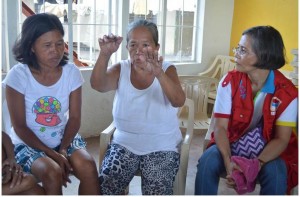
Tacloban City, Leyte – Forty-nine-year-old Rosario Cajefe wakes up every morning doing the same old household chores. This time, however, is different. She no longer does these chores in a place she calls home.
The Cajefe family is one of the 55,908 displaced families in the city due to the onslaught of Typhoon Yolanda. They are now taking refuge at San Jose Central School, one of the evacuation camps in the city.
Despite the tragic experience, Rosario remains positive. Knowing that she is not alone gives her the courage to start moving forward and begin rebuilding their lives little by little.
Rosario regained her optimism after attending a number of critical incident stress debriefing sessions (CISD) with stress debriefers from the Department of Social Welfare and Development (DSWD).
Sharing
The CISD is a series of sessions administered by social workers aimed at enabling the victims to overcome the trauma caused by crisis such as loss of a loved one and loss of properties.
Sharing of experiences is one of the CISD strategies.
“Usa ka adlaw ugsa han bagyo, an am pamilya nag-evacuate ngadto han balay han am sangkay. Kahuna nam, talwas kami didto. Ngay-an, an tubig tigda humata-as mahitungod hine nga storm surge (A day before the typhoon hit, our family already evacuated to a friend’s house. We thought it was the safest place to stay. However, the water suddenly rose due to the storm surge),” she shared during the session, her pain still evident in her expressions.
Rosario sees the sharing sessions similar to how she and her neighbors in the evacuation camp relate their respective experiences. For her, pouring out her emotions and stories does her good.
“Kun ginpapagawas ko an ak mga eksperiensya, nag-uupay tak pamati. Hine nga sesyon, baga man la ak hin nakikipag-chat han ak mga sangkay; an ak pamati, baga hin mayda ak nasasandigan (When I share my experiences, I feel better. This session feels like chatting with my friends. It feels like I have someone I can lean on),” she shared.
The DSWD said that CISD sessions enable the survivors to understand that they are not alone in their difficulties. It also serves as a venue to discuss their thoughts and feelings in a controlled and safe environment.
Through the sessions, their tension, anger and other negative emotions brought by the traumatic experience will be eased.
Moving forward
Despite being a victim of disaster, Rosario remains hopeful.
“Nakakarawat kami hin damu nga bulig. Iba-iba nga organisasyon nahatag ha am hin pagkaon, banig, ngan iba nga importante nga kagamitan. Mahitungod hine nga suporta, abat namon nga di kami nag-uusahan. (We receive a lot of support here. Different organizations provide us food, mats and other basic necessities. Because of these support, we never felt being alone.)”
Rosario added that the support boosted her determination to restore the normal life of her family.
Although they rely on the assistance provided by the government and some non-government organizations, they intend to be back on their feet as soon as possible.
Her husband currently participates in the clearing and cleaning operations in their barangay in exchange for monetarycompensation which they intend to use to restart their small food vending business.
Through this, Rosario is confident that she and her husband can save some amount to rebuild their house where she can once again do the usual household chores for her family. ###


